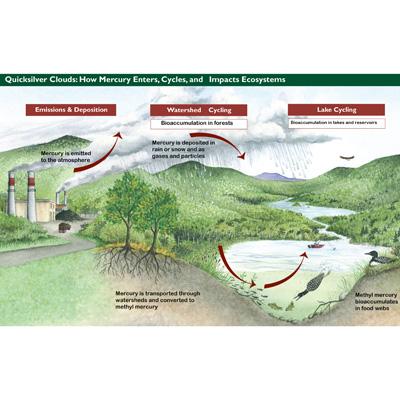Hubbard Brook Research Foundation, Science Links Project: Sources, Fate, and Effects of Mercury in the Northeastern U.S.

Mercury pollution is a vexing environmental problem that leads to the contamination of forests, soils, lakes, streams, and oceans with severe health implications for fish, wildlife, and people. Mercury contamination is widespread in the United States, as evidenced by fish consumption advisories that blanket the nation. Emitted into the atmosphere from coal-fired electric power plants and other sources, mercury is deposited into the environment in rain, snow, and fog. It bio-accumulates in waterways where it is passed to fish, wildlife, and people.
The Hubbard Brook Research Foundation's (HBRF) Science Links program addresses regional pollution and ecosystem health in order to better connect ecosystem science with environmental policy. In 2003, HBRF convened a team of mercury scientists to analyze mercury data in the region and address key questions facing decision-makers. The study resulted in a new assessment of mercury levels in wildlife and identified five confirmed and nine suspected mercury "hotspots" in the northeastern United States and southeastern Canada. The team concluded, among other things, that mercury levels, chiefly from local sources, in southern New Hampshire and northeastern Massachusetts are four to five times higher than current U.S. Environmental Protection Agency estimates.
Mercury Matters: Linking Mercury Science with Public Policy in the Northeastern United States, a new report geared for public audiences, was released in 2006. The report received significant attention nationally and has helped inform new policy initiatives to abate mercury pollution, as recently as 2011. To view/download the report and related articles, please visit: http://hubbardbrookfoundation.org/12-2/mercury-matters/.
